India’s economy can be seen struggling to recover its strong growth record, beset by record low inflation, a widening output gap, and short-term uncertainty from the introduction of a uniform sales tax.
The Economic Survey, on August 11 had clearly flagged the declining trend in India’s GDP growth.
It points out that though India’s GDP growth during the last two years was on an average 7.5 percent, it was achieved in the context of weak investments, export volume, and credit growth.
That will build pressure on the RBI to jettison its neutral monetary policy bias adopted just five months ago, setting the scene for lowering interest rates perhaps as early as next month, besides reminding yield-chasing investors that putting money in India is not without risks.
“Growth is mainly supported by private consumption at this juncture with private investment remaining anemic due to the high leverage of the corporate sector and weak demand. In other words, the quality of growth is not optimal at this stage.”
Any reduction in interest rates will be in contrast to what major central banks are trying to signal a rise in borrowing costs and could trip the Indian rupee which hit a 20-month high in April.
This would be bad news for a country that needs to attract billions of dollars in foreign investments to make up a shortfall in domestic capital.

